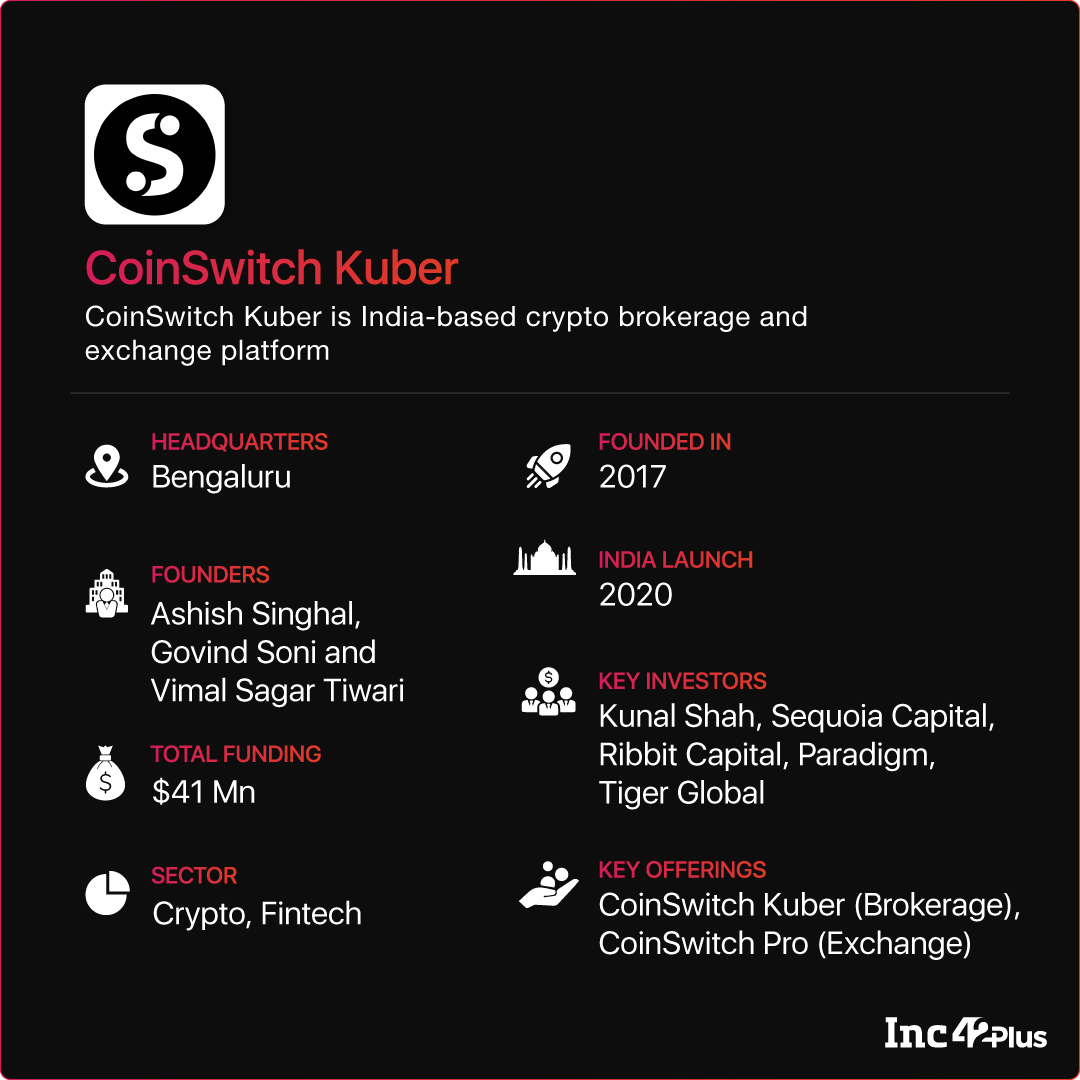Bengaluru-based crypto startup CoinSwitch Kuber recently raised $25 Mn in Series B round of funding from Tiger Global at $500 Mn valuation
Within 13 months of its operations in India, the crypto startup claims to have acquired more than 7.5 Mn users
Inc42 spoke to cofounder and CEO Ashish Singhal to understand how CoinSwitch Kuber became so successful in just 13 months
Bengaluru-based CoinSwitch Kuber, a crypto brokerage startup has enjoyed a dream run since its India launch last year. With more than 7.5 Mn users, it claims to be India’s largest crypto trading platform. Backed by the likes of Sequoia Capital, Ribbit Capital and Paradigm, it has also recently raised $25 Mn in Series B from Tiger Global Management, at a valuation of over $500 Mn, earlier this year. Total funding into the company exceeds $40 Mn, making it the most funded crypto startup in the country.
But what was more interesting about the latest funding round was that, unlike most startups who dream of getting funded by Tiger Global and its ilk, CoinSwitch Kuber was approached by the investment giant. According to Ashish Singhal, cofounder and CEO of the startup, “We did not reach out to Tiger Global for the funding. They contacted us and expressed their willingness to invest in our company.”
“It was them convincing us rather than me convincing them to take the money.”
This is unusual, to say the least, as crypto startups in India have struggled to raise funds due to the lack of regulatory clarity. In fact, total investment in the Indian crypto market is less than 0.5% of the global investments made in FY21.
So, what type of conversation used to take place between the founders of CoinSwitch Kuber and the suitors all this time?
Singhal is quick to explain. “The team, the India narrative and our success in India — these were the key topics of any discussion we had with any investor for previous funding rounds. Not just the investors who ended up successfully investing in us but any investor we had ever spoken to. And one common theme came up every time. We have realised that crypto is a very big market. Of course, it goes through a cycle of regulations in every country, and India is no exception.”
What Attracted Investors To CoinSwitch Kuber
Unlike many other platforms, CoinSwitch Kuber works as a brokerage firm and offers 100+ cryptocurrencies at ‘best market rates’. Singhal explains the backstory of the development. Having worked for global giants like Amazon, Microsoft and Zynga, cofounders Ashish Singhal, Govind Soni and Vimal Sagar Tiwari had been ethical hackers and crypto traders. It was around 2015-2016, they found it tough to track which exchange offered the best market price at what time for a particular crypto asset conversion.
“So, we built an algorithm that helped us find the best market price,” says Singhal.
The algorithm was used to crawl prices from different exchanges and indicate traders for the best price. Eventually, a full-fledged product was launched as CoinSwitch in June 2017. But given the regulatory hurdles in India, the platform was launched in the global market, and the traction was huge. “Within a month of its launch, the platform was able to garner revenue in millions. Within six months, we got funded by Sequoia Capital,” recalls Singhal.

From Global To Local: What Has Triggered The $500 Mn Valuation
CoinSwitch Kuber is a fast-paced company and is bound to emerge as the first crypto unicorn from India. Its current valuation is above $500 Mn, and this surge happened only after the startup introduced its products and services in the Indian market.
“Our journey has changed radically since last year. After the Supreme Court ruled out the Reserve Bank of India’s 2018 notification that had virtually banned the crypto businesses in the country, we decided to launch in India as well. But the idea was not to launch an exchange — we already have so many exchanges here — but to ensure a simple and easy trading experience. We wanted to provide the same retail experience that Swiggy and Zomato do. Their users simply add the food to their carts and checkout and it’s done. We wanted to make buying and selling crypto as simple as that. After all, it is difficult to explain the order book to users at scale,” says Singhal.
Finally, Coinswitch Kuber was born on June 1, 2020, and its focus is the Indian market. Within 13 months of its operations here, the crypto startup claims to have acquired more than 7.5 Mn users in India. The user base is so huge that the company, earlier available in 160 countries, has now shifted its focus from global to local.
“CoinSwitch Kuber is not an exchange. We are an exchange aggregator. That is why we don’t have open order books available. It’s a brokerage firm. However, we have CoinSwitch Pro, which is an exchange.”
The fast growth and a large consumer base have undoubtedly boosted the company’s valuation. But there are multiple factors that contribute to the valuation of a company, explains Singhal.
One such factor is, obviously, risk. A lot of industry segments/markets do not have the inherent risk. But the cryptocurrency market is an exception due to its unregulated nature in India. That is the fundamental difference between crypto companies and other startups in India. But its current unregulated nature also gives a unique opportunity to investors. Once it gets regulated, investors in the crypto space will see a much bigger market size.
Finally, The Big Question: Who Should Regulate Crypto In India?
Forget cryptocurrency-specific regulation; there has been massive confusion over who should regulate the crypto market in India. Should it be the RBI, the country’s central bank, or the Securities and Exchange Board of India (SEBI), the capital market regulator? It all depends on how the authorities classify crypto, says Singhal.
“You can’t equate it with any other industry. I personally think SEBI will be the right regulatory body as crypto should be regulated from an investment standpoint. SEBI can come up with rules and regulations similar to what it has in place for the stock market. When the crypto market evolves further, it (SEBI) can set up a separate body for regulation,” he adds.
Asked how to address the government’s concerns regarding the crypto market (money laundering, terror financing, drug deals and other criminal activities), Singhal thinks there has to be a starting point. To begin with, India should look at crypto classification and determine whether these will be treated as assets or commodities. Once that happens, the country will have to look at the regulations and regulatory bodies to protect users’ rights.







![Read more about the article [Funding alert] CoinDCX is first crypto startup to enter unicorn club after $90M fundraise led by B Capital](https://blog.digitalsevaa.com/wp-content/uploads/2021/08/Imagesdeu-1628564148889-300x150.jpg)


